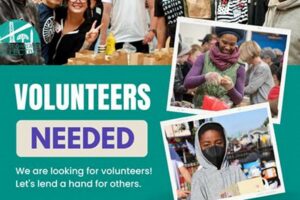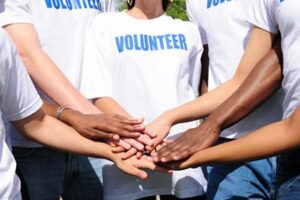Table of Contents
In the wake of Hurricane Ian, many people are asking how they can help those affected by the storm. Volunteering is a great way to make a difference. There are many organizations in Florida and around the country that are coordinating volunteer efforts. Whether you’re looking to donate your time, money, or skills, there are opportunities for everyone to get involved.
In this article, we’ll provide you with information on how to volunteer for Hurricane Ian relief efforts, including where to find volunteer opportunities, what types of help are needed, and how to prepare for your volunteer experience. Whether you’re a seasoned volunteer or it’s your first time, we hope you’ll find this information helpful as you consider how you can make a difference in the lives of those affected by Hurricane Ian.
Before you jump into volunteering, it’s important to take some time to consider your skills and interests, as well as the amount of time and resources you have available. There are many different ways to volunteer, from donating money to helping with cleanup efforts. Choose an opportunity that is a good fit for your skills and abilities.
How to Volunteer for Hurricane Ian
Make a difference in the lives of those affected by Hurricane Ian by volunteering your time, money, or skills.
- Find volunteer opportunities.
- Choose an opportunity that fits your skills.
- Prepare for your volunteer experience.
- Be flexible and patient.
- Stay safe and informed.
- Work with reputable organizations.
- Consider donating money or supplies.
- Spread the word and encourage others to help.
By following these tips, you can make a meaningful contribution to the Hurricane Ian relief efforts and help those in need during this difficult time.
Find volunteer opportunities.
Once you’ve decided to volunteer for Hurricane Ian relief efforts, the next step is to find volunteer opportunities. There are many organizations coordinating volunteer efforts, both in Florida and around the country. Here are a few tips for finding volunteer opportunities:
1. Check with local organizations: Many local organizations, such as churches, community centers, and non-profit groups, are coordinating volunteer efforts. Contact these organizations directly to see how you can help.
2. Look for online volunteer opportunities: There are a number of websites and online platforms that list volunteer opportunities for Hurricane Ian relief efforts. Some popular options include:
- Volunteer Florida
- National Voluntary Organizations Active in Disaster (NVOAD)
- All Hands and Hearts
- Team Rubicon
- American Red Cross
3. Ask friends, family, and neighbors: Talk to your friends, family, and neighbors to see if they know of any volunteer opportunities. They may be aware of local organizations that are in need of volunteers.
4. Use social media: Social media can be a great way to find volunteer opportunities. Search for relevant hashtags, such as #HurricaneIanVolunteers or #FloridaVolunteers, to find posts from organizations that are looking for volunteers.
Once you’ve found a few volunteer opportunities that interest you, take some time to learn more about the organizations involved. Make sure they are reputable organizations that are using volunteers in a responsible and effective way.
Choose an opportunity that fits your skills.
When choosing a volunteer opportunity, it’s important to consider your skills, interests, and abilities. There are many different ways to volunteer, so you’re sure to find an opportunity that is a good fit for you.
- Physical labor: If you’re physically fit and able-bodied, you may be able to help with tasks such as clearing debris, cleaning up homes and businesses, or distributing food and water.
- Skilled labor: If you have specialized skills, such as carpentry, plumbing, or electrical work, you may be able to help with repairs and rebuilding efforts.
- Administrative work: If you have administrative skills, such as data entry, filing, or customer service, you may be able to help with tasks such as registering volunteers, managing donations, or answering phones.
- Emotional support: If you’re a good listener and have a compassionate heart, you may be able to help with emotional support efforts, such as providing counseling, childcare, or simply being a listening ear for those affected by the hurricane.
Consider your own skills and interests when choosing a volunteer opportunity. You’re more likely to be effective and satisfied with your volunteer experience if you’re doing something that you’re good at and that you enjoy.
Prepare for your volunteer experience.
Once you’ve chosen a volunteer opportunity, it’s important to prepare for your volunteer experience. Here are a few tips:
1. Contact the organization: Once you’ve signed up for a volunteer opportunity, contact the organization to confirm your participation. Find out what time you should arrive, what to wear, and what to bring. You should also ask about any training or orientation that is required.
2. Pack your bags: Pack a bag with everything you’ll need for your volunteer experience, including comfortable clothing, sturdy shoes, sunscreen, a hat, bug spray, a water bottle, and snacks. You may also want to pack a change of clothes in case you get wet or dirty.
3. Stay informed: Keep up-to-date on the latest news and information about Hurricane Ian and the relief efforts. This will help you understand the needs of the community and how you can best help.
4. Be prepared for long hours and difficult conditions: Volunteering in the aftermath of a hurricane can be physically and emotionally challenging. Be prepared for long hours, difficult conditions, and the possibility of seeing people who are suffering. It’s important to take care of yourself and know your limits.
By following these tips, you can prepare for your volunteer experience and make the most of your time helping those affected by Hurricane Ian.
Be flexible and patient.
When volunteering in the aftermath of a hurricane, it’s important to be flexible and patient. Things may not always go according to plan, and you may need to adjust your expectations. Here are a few tips for being flexible and patient:
- Be prepared for changes: Things can change quickly in the aftermath of a hurricane. Volunteer assignments may be canceled or changed at the last minute. Be prepared to go with the flow and adapt to new situations.
- Be patient with yourself: It’s important to be patient with yourself and others during this time. Everyone is dealing with stress and challenges. Don’t be discouraged if you make mistakes or if things don’t go perfectly.
- Be patient with others: Be patient with the people you’re volunteering with, as well as the people you’re helping. Everyone is going through a difficult time, and they may be feeling stressed, anxious, or overwhelmed.
- Take breaks when you need them: It’s important to take breaks when you need them, both physically and mentally. If you’re feeling overwhelmed, take a few minutes to rest and recharge. Don’t try to push yourself too hard.
By being flexible and patient, you can make the most of your volunteer experience and help those affected by Hurricane Ian in a meaningful way.
Stay safe and informed.
When volunteering in the aftermath of a hurricane, it’s important to stay safe and informed. Here are a few tips:
- Be aware of your surroundings: Pay attention to your surroundings and be aware of any potential hazards, such as downed power lines, damaged buildings, or flooding. Avoid entering any areas that are unsafe.
- Wear protective clothing: Wear sturdy shoes, long pants, and a long-sleeved shirt to protect yourself from debris, sharp objects, and insects.
- Stay hydrated: Drink plenty of water to stay hydrated, especially in hot weather. Avoid drinking alcohol or caffeine, as these can dehydrate you.
- Listen to local authorities: Stay informed about the latest news and information from local authorities. Follow their instructions and evacuate to a safe location if necessary.
By following these tips, you can stay safe and informed while volunteering in the aftermath of Hurricane Ian.
Work with reputable organizations.
When volunteering in the aftermath of a hurricane, it’s important to work with reputable organizations. This will help ensure that your time and resources are used effectively and that you are helping those who are most in need.
- Do your research: Before you sign up to volunteer with an organization, take some time to research the organization and make sure they are reputable. Look for organizations that have a good track record of helping people in need.
- Ask questions: When you contact an organization to volunteer, ask questions about their mission, their experience, and how they use volunteers. This will help you understand the organization and how you can best help.
- Be wary of scams: Unfortunately, there are some scammers who try to take advantage of people’s generosity in the aftermath of a disaster. Be wary of organizations that ask for money or personal information upfront. Legitimate organizations will not ask for this information.
- Trust your instincts: If you have a gut feeling that an organization is not reputable, it’s probably best to listen to your instincts and volunteer with a different organization.
By working with reputable organizations, you can be sure that your time and resources are used effectively and that you are helping those who are most in need.
Consider donating money or supplies.
If you’re not able to volunteer your time, you can still help those affected by Hurricane Ian by donating money or supplies.
- Donate money: Donating money is a great way to help those affected by Hurricane Ian. There are many organizations that are accepting donations, such as the American Red Cross, Salvation Army, and United Way. You can also donate directly to local organizations that are helping people in your community.
- Donate supplies: There are many supplies that are needed in the aftermath of a hurricane, such as food, water, clothing, and cleaning supplies. You can donate supplies to local organizations that are collecting donations, or you can purchase supplies and send them directly to affected areas.
- Donate blood: Donating blood is another great way to help those affected by Hurricane Ian. Blood is needed to help people who have been injured in the hurricane. You can donate blood at local blood banks.
- Donate your time: Even if you can’t donate money or supplies, you can still donate your time. There are many organizations that need volunteers to help with things like sorting donations, preparing meals, and cleaning up debris.
No matter how you choose to help, your donation will make a difference in the lives of those affected by Hurricane Ian.
Spread the word and encourage others to help.
Once you’ve decided to help those affected by Hurricane Ian, you can spread the word and encourage others to help as well.
- Talk to your friends and family: Talk to your friends and family about Hurricane Ian and the need for help. Encourage them to donate money, supplies, or their time.
- Share on social media: Share information about Hurricane Ian and how people can help on social media. Use hashtags like #HurricaneIan and #FloridaStrong to reach a wider audience.
- Contact local organizations: Contact local organizations that are helping those affected by Hurricane Ian and ask how you can help spread the word about their efforts.
- Write to your elected officials: Write to your elected officials and urge them to provide support to those affected by Hurricane Ian. You can also ask them to support policies that will help prevent or mitigate the impact of future hurricanes.
By spreading the word and encouraging others to help, you can make a bigger difference in the lives of those affected by Hurricane Ian.
FAQ
Here are some frequently asked questions about volunteering in the aftermath of Hurricane Ian:
Question 1: How can I find volunteer opportunities?
Answer 1: There are many organizations that are coordinating volunteer efforts for Hurricane Ian relief. You can find volunteer opportunities by checking with local organizations, looking for online volunteer opportunities, and asking friends, family, and neighbors.
Question 2: What types of volunteer opportunities are available?
Answer 2: There are many different types of volunteer opportunities available, including helping with cleanup efforts, distributing food and water, providing emotional support, and helping with repairs and rebuilding.
Question 3: What skills do I need to volunteer?
Answer 3: You don’t need any special skills to volunteer. There are opportunities for people of all ages and abilities.
Question 4: What should I bring with me when I volunteer?
Answer 4: Be sure to pack comfortable clothing, sturdy shoes, sunscreen, a hat, bug spray, a water bottle, and snacks.
Question 5: How can I stay safe while volunteering?
Answer 5: Be aware of your surroundings, wear protective clothing, stay hydrated, and listen to local authorities.
Question 6: How can I make the most of my volunteer experience?
Answer 6: Be flexible, patient, and prepared to work hard. Be respectful of the people you’re helping and the people you’re volunteering with. Take breaks when you need them and stay hydrated.
Question 7: How can I help if I can’t volunteer?
Answer 7: If you can’t volunteer, you can still help by donating money or supplies, spreading the word about volunteer opportunities, and encouraging others to help.
No matter how you choose to help, your contribution will make a difference in the lives of those affected by Hurricane Ian.
In addition to volunteering, there are a number of other ways you can help those affected by Hurricane Ian. Consider donating money or supplies, spreading the word about volunteer opportunities, and encouraging others to help.
Tips
Here are a few tips for volunteers who are helping with Hurricane Ian relief efforts:
Tip 1: Be flexible and patient. Things may not always go according to plan, and you may need to adjust your expectations. Be prepared for long hours and difficult conditions, and be patient with yourself and others.
Tip 2: Be prepared. Pack comfortable clothing, sturdy shoes, sunscreen, a hat, bug spray, a water bottle, and snacks. You may also want to pack a change of clothes in case you get wet or dirty.
Tip 3: Stay safe. Be aware of your surroundings, wear protective clothing, stay hydrated, and listen to local authorities. Be sure to take breaks when you need them and don’t push yourself too hard.
Tip 4: Be respectful. Be respectful of the people you’re helping and the people you’re volunteering with. Be understanding of the challenges they’re facing and be willing to help in any way you can.
By following these tips, you can make the most of your volunteer experience and help those affected by Hurricane Ian in a meaningful way.
Volunteering is a great way to make a difference in the lives of those affected by Hurricane Ian. By following the tips above, you can prepare for your volunteer experience and make the most of your time helping others.
Conclusion
Volunteering is a great way to make a difference in the lives of those affected by Hurricane Ian. By donating your time, money, or skills, you can help those who have lost everything rebuild their lives.
There are many ways to get involved, so find an opportunity that is a good fit for your skills and interests. You can help with cleanup efforts, distribute food and water, provide emotional support, or help with repairs and rebuilding.
No matter how you choose to help, your contribution will be appreciated. The people of Florida are resilient, and with the help of volunteers, they will rebuild and recover from this devastating storm.
Thank you for your generosity and compassion.






